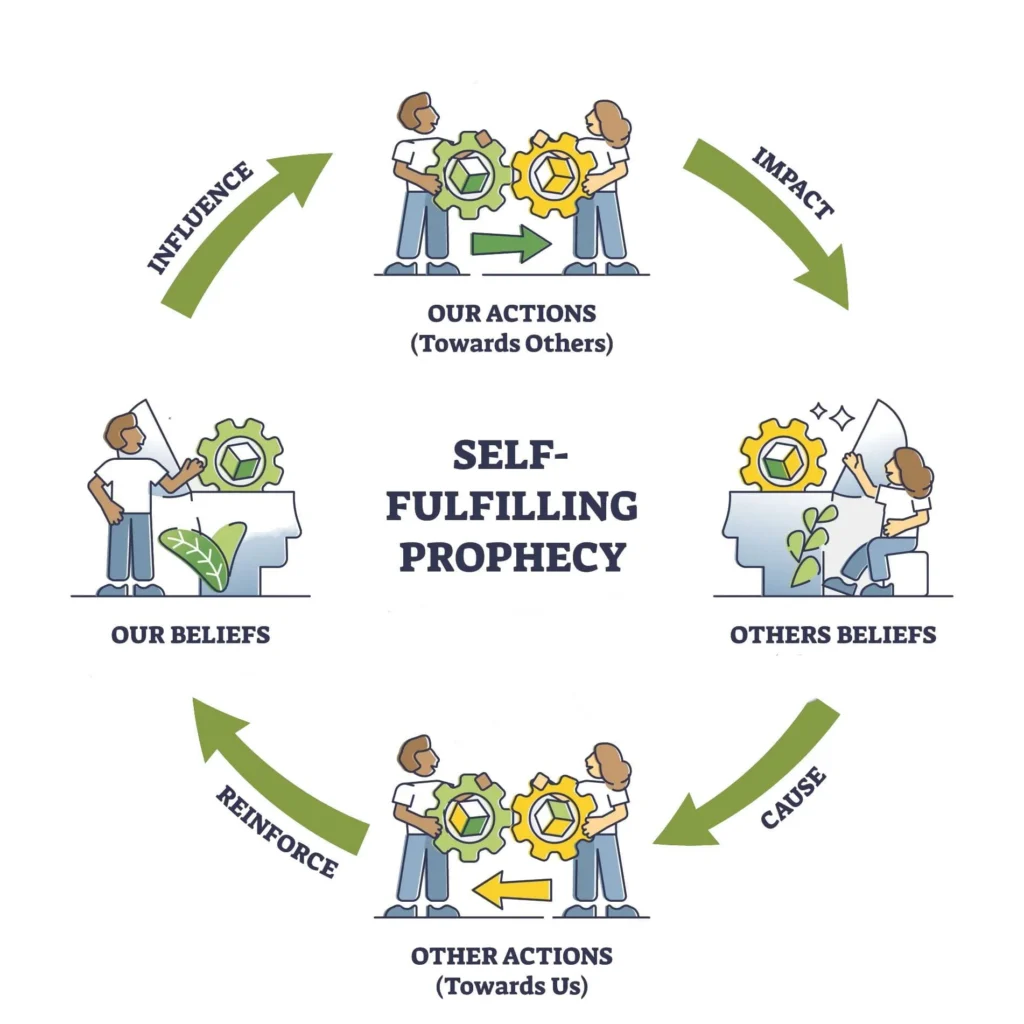Every day, millions of people turn to their horoscopes for insight—whether it’s a quick read for motivation, a search for reassurance, or simply a moment of curiosity. From brief columns in magazines to in-depth sessions with professional astrologers, astrology continues to captivate audiences worldwide. But can the celestial predictions about our personalities and futures actually impact the way we live our lives?
This article dives into the fascinating idea of self-fulfilling prophecy and its possible connection to astrology. Could our belief in what the stars predict influence our actions, behaviors, and ultimately, the course of our lives? Join us as we explore how our faith in astrological forecasts might interplay with our choices, shaping our realities in ways we may not realize.
What is Self-Fulfilling Prophecy?
A self-fulfilling prophecy is a psychological phenomenon where a belief or expectation, whether accurate or not, influences actions and behaviors in a way that causes the belief to come true. Essentially, our mindset and assumptions can shape reality by setting a series of events into motion.

How Does It Work?
Here’s a simple breakdown. The process unfolds in three steps:
- Initial Belief or Expectation: A person starts with a positive or negative belief about a situation or outcome.
- Behavior Influenced by the Belief: That belief impacts how the person acts, consciously or unconsciously.
- Outcome Reflects the Belief: These actions affect how others respond and how events progress, leading to an outcome that aligns with the original belief.
Example of a Self-Fulfilling Prophecy:
Imagine a student convinced they will fail an important exam. This negative belief leads to feelings of anxiety and demotivation, which, in turn, result in inadequate preparation. When exam day arrives, their lack of preparation leads to poor performance, confirming their expectation of failure. In this scenario, their belief actively shaped their behavior, which directly contributed to the outcome.
This cycle demonstrates how powerful expectations can be—guiding not only how we behave but also how the world responds to us.
How Beliefs Shape Reality: The Psychology Behind Self-Fulfilling Prophecies
Our beliefs hold incredible power to shape our reality. This influence is at the heart of the self-fulfilling prophecy — the psychological phenomenon where expectations about a situation or person lead us to act in ways that make those expectations come true. But what are the underlying mechanisms that drive this powerful process?
Psychological Perspective
The psychological dynamics of self-fulfilling prophecies can be understood through several key mechanisms:
- Confirmation Bias: Humans naturally seek and focus on information that supports their existing beliefs, while ignoring evidence that contradicts them. For example, someone convinced they are poor at public speaking might fixate on minor mistakes during a presentation while dismissing positive feedback. This selective focus reinforces the negative belief, perpetuating a cycle of self-doubt.
- Behavioral Confirmation: Our expectations subtly guide our behaviors, which in turn affect how others respond to us. This feedback loop often confirms our initial beliefs. For instance, if someone believes they are unlikable, they might act withdrawn or defensive, prompting others to disengage — and thus reinforcing the belief of being unlikable.
- Placebo Effect: A clear example of belief’s power, the placebo effect shows how merely expecting a positive outcome — even from an inactive treatment — can produce real, measurable improvements. This underscores how beliefs can shape physical and psychological outcomes.
Real-World Examples
- Relationships: A person convinced their partner will leave them might exhibit clingy or insecure behavior, unintentionally driving their partner away and confirming their fear.
- Workplace: Believing you’re unfit for a promotion may result in underperformance, further reinforcing doubts about your abilities.
- Sports: An athlete who expects to perform poorly might become anxious, lowering their confidence and adversely affecting their performance.
Key Takeaway: Understanding these psychological mechanisms is crucial for breaking free from negative cycles. By becoming aware of how beliefs shape reality, we can cultivate positive expectations and behaviors that align with our goals and aspirations.
Astrology and the Self-Fulfilling Prophecy: Could Your Horoscope Be Influencing You?
Astrology, while not scientifically validated, holds immense appeal for many, offering guidance and insights through horoscopes and zodiac signs. This invites an intriguing question: could believing in astrology contribute to self-fulfilling prophecies? In other words, could reading your horoscope subtly shape your thoughts, actions, and ultimately, your experiences?

How Horoscopes Might Trigger Self-Fulfilling Prophecies
- Selective Attention
When you read a horoscope, you might unconsciously focus on events that seem to align with its predictions, a phenomenon known as confirmation bias. For instance, if your horoscope predicts workplace challenges, you might pay more attention to minor conflicts with colleagues, amplifying their significance while ignoring positive interactions. - Behavioral Changes
Your expectations, shaped by horoscopes, can subtly alter your behavior. For example:- If told you’ll have a “lucky day in love,” you might be more confident and outgoing, increasing your chances of meaningful encounters.
- Conversely, a negative prediction could lead to cautious or withdrawn behavior, possibly creating difficulties where none might have existed.
- Self-Perception
Repeated exposure to zodiac personality traits can influence how you view yourself. For example:- A Scorpio constantly reading about being “intense and determined” may start embodying these traits, even if they weren’t prominent before.
- Over time, this self-perception may influence actions that reinforce these characteristics, solidifying the association between astrology and personal behavior.
The Power of Belief
While astrology lacks scientific support, the belief in it can have tangible effects. By shaping expectations and influencing actions, horoscopes might indirectly create the very experiences they predict. This highlights the role of belief systems in shaping reality, even when rooted in subjective interpretations.
Understanding this connection can help us reflect on how our beliefs, including those tied to astrology, influence our daily lives and decisions.
Examples of the Self-Fulfilling Prophecy in Action with Horoscopes
Horoscopes often provide broad, relatable predictions, which can subtly influence thoughts and behaviors. Here are specific examples of how they might trigger self-fulfilling prophecy:
Love and Relationships
Imagine reading a horoscope that says, “Today, you’re lucky in love. Be open to new possibilities.” Inspired by this positive outlook, you may act more outgoing and approachable smiling at strangers, initiating conversations, or accepting a social invitation. These actions increase the likelihood of meeting someone new, creating a romantic opportunity that appears to validate the horoscope’s prediction. Here, the prophecy fulfills itself through the reader’s altered behavior.
Finances and Investments
A horoscope might warn, “Be cautious with your finances today; it’s not a good time for risks.” Taking this advice to heart, you may decide against investing in a promising opportunity or scrutinize your spending more closely. While this careful approach could prevent losses, it might also lead you to credit the horoscope for your financial prudence. In this case, your actions—guided by the horoscope—align with the prediction, reinforcing its perceived accuracy.
Energy and Mood
Consider reading, “You may feel unusually tired today—take it easy.” The suggestion alone might make you hyperaware of fatigue, leading to decreased motivation or skipping your workout. Conversely, if the horoscope reads, “Your energy will soar today,” you might approach the day with heightened enthusiasm, accomplishing more than usual. In both cases, your belief in the prediction shapes your behavior and reinforces the outcome.
The Power of Interpretation
These examples highlight how vague, general predictions in horoscopes can influence behavior. By subtly altering actions or perceptions, readers can unwittingly create outcomes that align with their horoscope, lending credence to the prediction. Ultimately, the actual impact of a horoscope depends on how individuals interpret and respond to it.
The Power of Belief: Positive and Negative Self-Fulfilling Prophecies
The self-fulfilling prophecy is a powerful psychological phenomenon that can either work in your favor or create barriers, depending on the beliefs you hold. By shaping your actions and responses, these beliefs influence your reality, often in profound ways. Let’s explore how this dual-edged phenomenon manifests:

Positive Self-Fulfilling Prophecies
Positive expectations can drive behaviors that align with success and achievement. When you believe in a positive outcome, you’re more likely to take steps to make it a reality. For example:
- Aiming for Success: Imagine believing you can excel at a presentation. This belief may lead you to prepare thoroughly, practice confidently, and deliver effectively. The positive result reinforces your initial confidence.
- Building Relationships: If you believe people will like you at a social event, you’re likely to act more outgoing and approachable, creating connections that affirm your expectation.
Negative Self-Fulfilling Prophecies
On the flip side, negative expectations can undermine your efforts and create obstacles, even when success is within reach. For instance:
- Undermining Performance: If you believe you’ll fail a test, that anxiety might lead to procrastination or ineffective study habits, ultimately resulting in poor performance.
- Strained Relationships: Believing a partner is dissatisfied may cause you to act insecure or distant, unintentionally creating conflict that validates your fears.
Harnessing the Power of Belief
The good news is that awareness of this phenomenon gives you the ability to influence it. Cultivating positive beliefs and focusing on constructive actions can set in motion a cycle of success. Similarly, recognizing and challenging negative beliefs can break self-defeating patterns.
By shifting your mindset and aligning your actions with your goals, you can turn the self-fulfilling prophecy into a tool for personal growth and achievement.
How to Break Free from Negative Self-Fulfilling Prophecies
Negative self-fulfilling prophecies can create invisible barriers, holding you back from achieving your potential. The good news is that these patterns are not permanent; they can be broken with intentional effort and mindset shifts. Here’s how:

1. Become Aware of Your Beliefs
The first step is to identify the limiting beliefs that might be influencing your behavior. Pay attention to your inner dialogue and notice recurring thoughts like, “I’m not good enough” or “This will never work.” Awareness is crucial to begin the process of change.
2. Challenge Negative Thoughts
Once you’ve pinpointed negative beliefs, question their validity. Ask yourself:
- “Is this belief based on facts or assumptions?”
- “What evidence supports or contradicts this thought?”
- “What would I tell a friend if they felt this way?”
By scrutinizing your beliefs, you can start to uncover their flaws and replace them with more balanced perspectives.
3. Replace with Positive, Empowering Thoughts
Swap self-defeating thoughts with affirmations that reflect your strengths and potential. For example:
- Instead of “I’ll fail,” try: “I’ve prepared, and I’m capable of doing well.”
- Instead of “I’m not good at this,” try: “I can improve with practice and effort.”
Over time, these positive affirmations can reshape your mental framework.
4. Take Small, Consistent Actions
Break the cycle of doubt by taking tangible steps toward your goals. Start small—even tiny accomplishments can create momentum. Celebrate these wins to reinforce your confidence and challenge the narrative of failure.
5. Surround Yourself with Positivity
Seek out supportive people who encourage and uplift you. Positive reinforcement from others can help counteract self-doubt and inspire belief in your abilities.
Conclusion
The self-fulfilling prophecy shows us that our beliefs have immense power to shape our reality. While astrology and horoscopes may or may not influence our destinies, the way we interpret and act on them undeniably affects our lives. By breaking free from negative self-fulfilling prophecies and cultivating positive beliefs, you can take control of your narrative and shape a brighter future. Your mindset is your greatest tool to create the outcomes you desire.
Frequently Asked Questions (FAQs)
Can self-fulfilling prophecies be about other people, not just yourself?
Yes, self-fulfilling prophecies can extend beyond yourself and influence how you perceive and interact with others. For instance, if a manager assumes an employee is unreliable, they might delegate fewer important tasks to them. In turn, the employee may feel unmotivated and fail to perform their best, reinforcing the manager’s original belief. This phenomenon, also called the Pygmalion effect, highlights the powerful role of expectations in shaping interpersonal dynamics.
How can I tell if a self-fulfilling prophecy is happening to me?
To recognize if you’re caught in a self-fulfilling prophecy, reflect on these questions:
- Do I hold recurring beliefs about myself or situations that seem to consistently play out?
- Are my actions or choices influenced by these beliefs in a way that might contribute to the outcomes?
- Am I focusing only on evidence that confirms my expectations while disregarding contradictory signs?
If your answers lean toward “yes,” it might be a sign that a self-fulfilling prophecy is shaping your experiences.
Do all psychologists believe in self-fulfilling prophecy?
The concept of self-fulfilling prophecy is well-established in psychology, supported by substantial research in social and behavioral sciences. While not all psychologists may emphasize it equally, the phenomenon is widely recognized as a real and impactful mechanism, especially in areas like education, workplace dynamics, and interpersonal relationships.
Is there any scientific proof that astrology is real?
No, astrology lacks scientific evidence. While it can provide a sense of fun or personal insight for some, there is no credible research to support the claim that celestial positions at birth dictate personality traits, life events, or destiny. Astrology is best viewed as a tool for entertainment or reflection rather than a science-based framework.
Can reading my horoscope daily be harmful?
Reading your horoscope daily is typically harmless. However, it can become problematic if you rely on predictions to guide major decisions or if negative readings regularly cause stress or anxiety. To avoid potential harm, treat horoscopes lightly and use critical thinking to ensure they don’t dictate your emotions or behavior. Keep them as a source of fun or inspiration, rather than a rulebook for your life.






